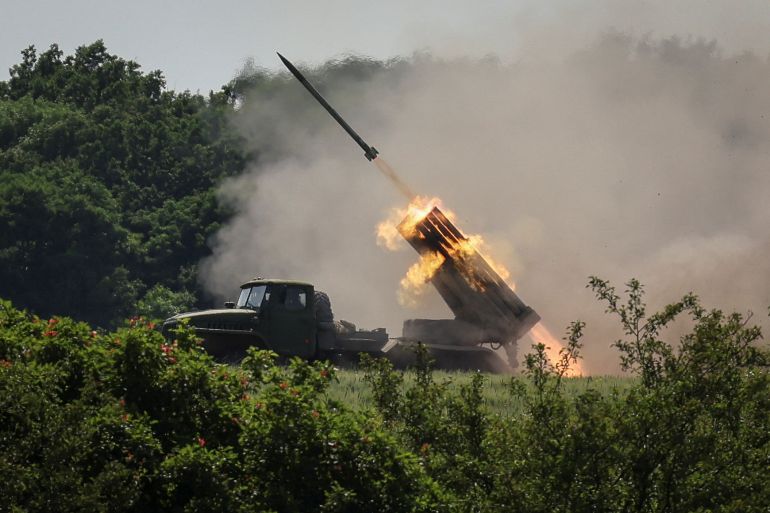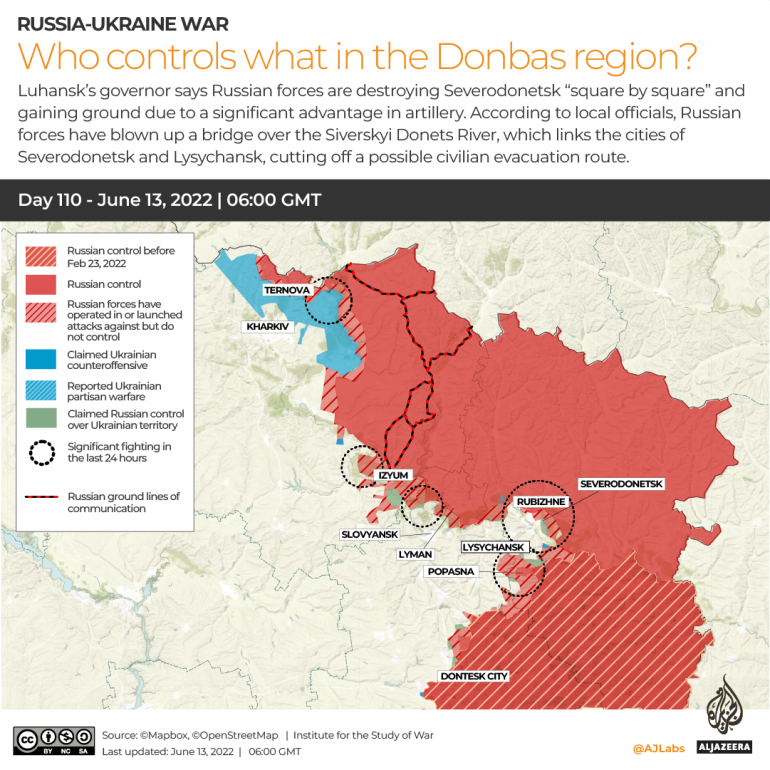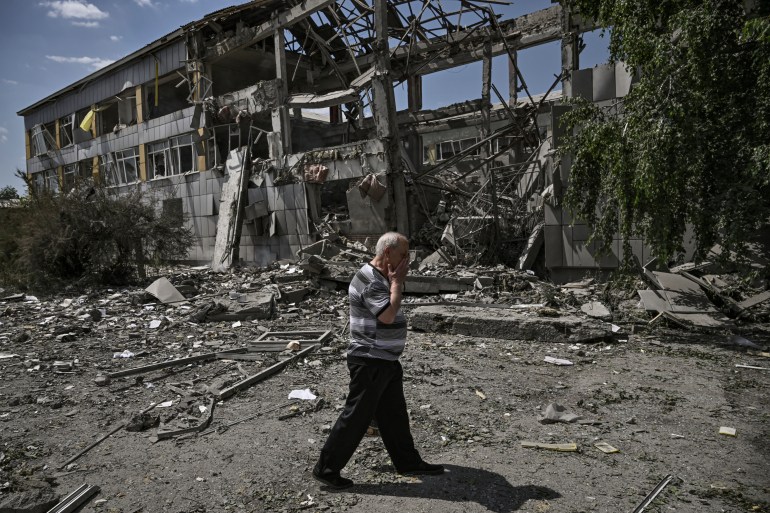The battle of Donbas could prove decisive in Ukraine war
Russia’s focus in the conflict is now Donbas and a battle that could decide the direction of the entire war.

Day after day, Russia is pounding the Donbas region of Ukraine with relentless artillery and air raids, making slow but steady progress to seize the industrial heartland of its neighbour.
With the conflict now in its fourth month, it’s a high-stakes campaign that could dictate the course of the entire war.
Keep reading
list of 4 itemsRussia ‘earned’ $98bn in fuel exports in 100 days of Ukraine war
Russia-Ukraine war: List of key events, day 110
Ukraine latest updates: ‘All Severodonetsk bridges destroyed’
If Russia prevails in the battle of Donbas, it will mean that Ukraine loses not only land but perhaps the bulk of its most capable military forces, opening the way for Moscow to grab more territory and dictate its terms to Kyiv.
A Russian failure in the battle could lay the grounds for a Ukrainian counteroffensive – and possibly lead to political upheaval for the Kremlin.
Following botched early attempts in the invasion to capture Kyiv and the second-largest city of Kharkiv without proper planning and coordination, Russia turned its attention to the Donbas, a region of mines and factories where Moscow-backed separatists have been fighting Ukrainian forces since 2014.
Learning from its earlier missteps, Russia is treading more carefully there, relying on longer-range bombardments to soften Ukrainian defences.
It seems to be working: The better-equipped Russian forces have made gains in both the Luhansk and Donetsk regions that make up the Donbas, controlling more than 95 percent of the former and about half of the latter.
Ukraine is losing between 100 and 200 soldiers a day, presidential adviser Mykhailo Podolyak told the BBC, as Russia has “thrown pretty much everything non-nuclear at the front”.

‘Extremely difficult’
Ukrainian Defence Minister Oleksii Reznikov described the combat situation as “extremely difficult”, using a reference to an ancient deity of sacrifice by saying: “The Russian Moloch has plenty of means to devour human lives to satisfy its imperial ego”.
When the war was going badly for Russia, many thought Russian President Vladimir Putin might claim victory after some gains in Donbas and then exit a conflict that has seriously bruised his country’s economy and stretched its resources.
But the Kremlin has made clear it expects Ukraine to recognise all the gains Russia has made – including its 2014 annexation of the Crimean Peninsula – something Kyiv has ruled out.
Russian forces control the entire Sea of Azov coast, including the strategic port of Mariupol, the entire Kherson region – a key gateway to Crimea – and a large chunk of the Zaporizhia region that could aid a further push deeper into Ukraine. Few expect that Putin will stop.
Western officials still praise the ability of Ukrainian forces to defend their country, fighting back fiercely, relying on artillery and retreating in some sections while launching frequent counterattacks.
A senior Western official who spoke on condition of anonymity told the Associated Press news agency the Russian campaign “continues to be deeply troubled at all levels”, explaining how Moscow’s forces are taking “weeks to achieve even modest tactical goals such as taking individual villages”.
Last month, the Russians lost nearly an entire battalion in a botched attempt to cross the Siverskyi Donets River and set up a bridgehead. Hundreds were killed and dozens of armoured vehicles were destroyed.
“There is a sense of strategic improvisation or muddling through,” the official said.
Russia has a clear edge in artillery in the battle for Donbas, thanks to a bigger number of heavy howitzers and rocket launchers and abundant ammunition. The Ukrainians have had to be economical in using their artillery, with the Russians constantly targeting their supply lines.
Ukraine has begun to receive more heavy weapons from Western allies, who have provided dozens of howitzers and are now planning to start delivering multiple rocket launchers.
“Russian objectives in the context of this war are shifting in relation to the situation on the ground,” said Eleonora Tafuro Ambrosetti, an analyst with the Milan-based Italian Institute for International Political Studies. She noted that Russia could try to damage Ukraine’s economy further by seizing its entire coastline to deny access to shipping.

Moscow’s Black Sea goals
A top Russian general already has spoken of plans to cut off Ukraine from the Black Sea by seizing the Mykolaiv and Odesa regions all the way to the border with Romania, a move that would also allow Moscow to build a land corridor to Moldova’s separatist region of Transnistria that hosts a Russian military base.
Such ambitions all hinge on Moscow’s success in the east.
A defeat in the fight for Donbas would put Kyiv in a precarious position, with new recruits lacking the skills of battle-hardened soldiers now fighting in the east and supplies of Western weapons insufficient to fend off a potentially deeper Russian push.
Ukrainian officials brushed off such fears, voicing confidence that their country’s military can hold out to stem the Russian advances and even launch a counterattack.
“Ukraine’s plan is clear: Kyiv is wearing the Russian army out, trying to win time for more deliveries of Western weapons, including air defence systems, in the hope of launching an efficient counteroffensive,” said analyst Mykola Sunhurovsky of the Razumkov Center, a Kyiv-based think-tank.